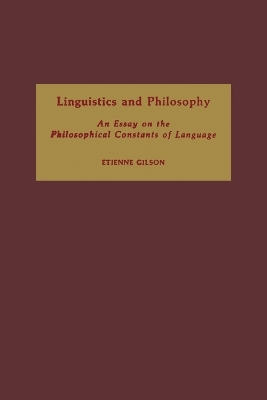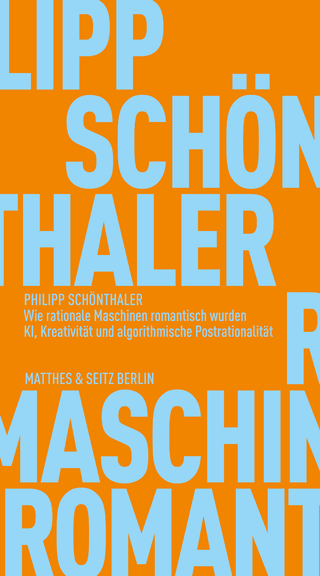
Linguistics and Philosophy
An Essay on the Philosophical Constants of Language
Seiten
2017
University of Notre Dame Press (Verlag)
978-0-268-16053-1 (ISBN)
University of Notre Dame Press (Verlag)
978-0-268-16053-1 (ISBN)
- Lieferbar (Termin unbekannt)
- Versandkostenfrei innerhalb Deutschlands
- Auch auf Rechnung
- Verfügbarkeit in der Filiale vor Ort prüfen
- Artikel merken
The dual purpose of this volume - to provide a distinctively philosophical introduction to logic, as well as a logic-oriented approach to philosophy - makes it a unique and worthwhile primary text for logic or philosophy courses.
This marks the first time Linguistics and Philosophy, published in France in 1969, has been translated into English. Here, philosopher Etienne Gilson examines linguistics—from Descartes to Derrida—as he argues for the irreducibility of thought to language. Reviewing the theories of figures such as Condillac, Mallarmé, de Saussure, and Vendryès, Gilson looks at the process whereby thought is translated into language, seeking to reestablish the notion of concepts as mediators.
The temptation of linguists to philosophize in such areas as the relationship of thought, language, and the world prompted Gilson to write Linguistics and Philosophy. In the introduction he does not claim to be a linguist, but rather a philosopher exercizing his option of selecting certain issues involving language that seem to be "philosophic constants."
Decidedly philosophical in his approach, Gilson examines the way in which words, meanings, and languages grow continually and creatively, an inextricable part of life in society. He also explores our ability to construct abstract thoughts that point to an immaterial power of human beings, and he laments the degeneration of modern language brought about by radio and television broadcasters, especially in connection with neologistic and linguistic borrowing from other languages.
We are currently observing the deterioration of language through the spoken word. In this fascinating work, Gilson demonstrates that the linguist cannot be indifferent to this occurrence.
This marks the first time Linguistics and Philosophy, published in France in 1969, has been translated into English. Here, philosopher Etienne Gilson examines linguistics—from Descartes to Derrida—as he argues for the irreducibility of thought to language. Reviewing the theories of figures such as Condillac, Mallarmé, de Saussure, and Vendryès, Gilson looks at the process whereby thought is translated into language, seeking to reestablish the notion of concepts as mediators.
The temptation of linguists to philosophize in such areas as the relationship of thought, language, and the world prompted Gilson to write Linguistics and Philosophy. In the introduction he does not claim to be a linguist, but rather a philosopher exercizing his option of selecting certain issues involving language that seem to be "philosophic constants."
Decidedly philosophical in his approach, Gilson examines the way in which words, meanings, and languages grow continually and creatively, an inextricable part of life in society. He also explores our ability to construct abstract thoughts that point to an immaterial power of human beings, and he laments the degeneration of modern language brought about by radio and television broadcasters, especially in connection with neologistic and linguistic borrowing from other languages.
We are currently observing the deterioration of language through the spoken word. In this fascinating work, Gilson demonstrates that the linguist cannot be indifferent to this occurrence.
Étienne Gilson (1884–1978) was a French philosopher and historian of philosophy. John Lyon has taught in departments of history, great books, history and philosophy of science, humanities, liberal arts, language and literature, and education. He has served as educational consultant at two universities and held administrative posts in five. He has translated several works from French and published in the history and philosophy of science.
| Erscheinungsdatum | 04.08.2016 |
|---|---|
| Übersetzer | John Lyon |
| Verlagsort | Notre Dame IN |
| Sprache | englisch |
| Maße | 152 x 229 mm |
| Gewicht | 345 g |
| Themenwelt | Geisteswissenschaften ► Philosophie ► Sprachphilosophie |
| Geisteswissenschaften ► Sprach- / Literaturwissenschaft ► Sprachwissenschaft | |
| ISBN-10 | 0-268-16053-8 / 0268160538 |
| ISBN-13 | 978-0-268-16053-1 / 9780268160531 |
| Zustand | Neuware |
| Haben Sie eine Frage zum Produkt? |
Mehr entdecken
aus dem Bereich
aus dem Bereich
Macht und Legitimität politischer Sprache im Prozess der europäischen …
Buch | Softcover (2023)
Nomos (Verlag)
74,00 €
KI, Kreativität und algorithmische Postrationalität
Buch | Softcover (2024)
Matthes & Seitz Berlin (Verlag)
16,00 €
Wie die Menschheit zu ihrer größten Erfindung kam
Buch | Softcover (2022)
C.H.Beck (Verlag)
18,00 €


